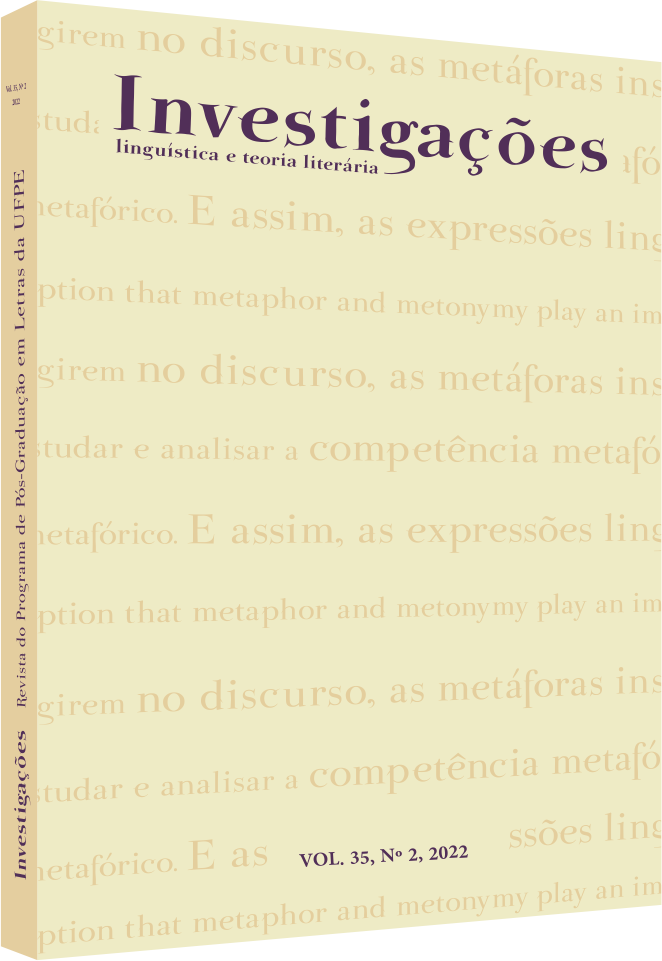O efeito de evidência dos sentidos nos processos algorítmicos do Facebook
DOI:
https://doi.org/10.51359/2175-294x.2022.253929Keywords:
ideology, meaning, reference, algorithms.Abstract
In this paper, I propose to take an analytical look at the algorithmic processes that regulate Facebook. Thus, I searched for documents that deal with the use of user data and the functioning of the news feed. The repetition of the adjective "relevant" in the texts found gave rise to questions. After all, what does Facebook mean by "relevant"? And what does Facebook think its users consider relevant? This article is interested in discussing the power relations in the techno(ideo)logical interweaving that determine and entangle subjects in different forms of subjection in the digital space.References
BENVENISTE, Émile. Da subjetividade na linguagem. In: BENVENISTE, Émile. Problemas de linguística geral I. Campinas: Pontes, 1995. p. 284-293.
CARDOSO, Sílvia Helena Barbi. A questão da referência: das teorias clássicas à dispersão de discursos. Campinas: Autores Associados, 2003.
HAN, Byung-Chul. No enxame: perspectivas do digital. Tradução de Lucas Machado. Petrópolis, RJ: Vozes, 2018.
INDURSKY, Freda. A fala dos quartéis e as outras vozes: uma análise do discurso presidencial da Terceira República brasileira (1964-1984). Tese (Doutorado em Linguística) - Universidade Estadual de Campinas, 1992.
INDURSKY, Freda. A fala dos quartéis e as outras vozes. 2. ed. Campinas: Editora da Unicamp, 2013.
KOCH, Ingedore Villaça. Referenciação e orientação argumentativa. In: KOCH, Ingedore Villaça; MORATO, Edwiges Maria; BENTES, Anna Christina (orgs.). Referenciação e discurso. São Paulo: Contexto, 2005.
MARTINS, Helena. Comunicações em tempos de crise: economia e política. São Paulo: Expressão Popular, Fundação Rosa Luxemburgo, 2020
MOROZOV, Evgeny. Big Tech: a ascensão dos dados e a morte da política. Tradução de Cláudio Marcondes. São Paulo: Ubu Editora, 2018.
PÊCHEUX, Michel; FUCHS, C. [1975]. A propósito da análise automática do discurso: atualização e perspectivas. In: GADET, Françoise; HAK, Tony (org.). Por uma análise automática do discurso: uma introdução à obra de Michel Pêcheux. Trad. de MARIANI, Betânia et al. 3. ed. Campinas: Editora da Unicamp, 1993. p. 163-252.
PÊCHEUX, Michel. Semântica e discurso: uma crítica à afirmação do óbvio [1975]. Tradução de Eni Puccinelli Orlandi et al. Campinas: Ed. Universidade Estadual de Campinas, 1995.
PÊCHEUX, Michel. Análise de Discurso e Informática [1981]. Tradução de Cristiane Dias. In: ORLANDI, Eni Puccinelli. Análise de Discurso: Michel Pêcheux. 3. ed. Campinas, SP: Pontes Editores, 2012. p. 275-282.
PÊCHEUX, Michel. Ler o arquivo hoje [1982]. Tradução de Maria das Graças Lopes Morin do Amaral. In: ORLANDI, Eni Puccinelli et al. (org.). Gestos de leitura: da história no discurso. 4. ed. Campinas, SP: Editora da Unicamp, 2014. p. 57-68.
PEQUENO, Vitor. Tecnologia e esquecimento: uma crítica a representações universais de linguagem. Campinas: Pontes Editores, 2020.
PERUZZO, C. M. K. Possibilidades, realidade e desafios da comunicação cidadã na web. MATRIzes, São Paulo, v. 12, n. 3, p. 77-100, set./dez. 2018.
ROBIN, Régine. História e linguística. Tradução de Adélia Bolle. São Paulo: Editora Cultrix, 1977.
SAUSSURE, F. de. Imutabilidade e mutabilidade do signo. In: SAUSSURE, F. de. Curso de Linguística Geral. 28. ed. São Paulo: Cultrix, 2000. p. 85-93.
ZUBOFF, Shoshana. Big Other: capitalismo de vigilância e perspectivas para uma civilização de informação. Tradução: Antonio Holzmeister Oswaldo Cruz e Bruno Cardoso. In: BRUNO, Fernanda et al. (orgs.). Tecnopolíticas da vigilância: perspectivas da margem. São Paulo: Boitempo, 2018.
Downloads
Published
How to Cite
Issue
Section
License
Copyright (c) 2022 Lisiane Schuster Gobatto

This work is licensed under a Creative Commons Attribution 4.0 International License.
Authors who publish with Revista Investigações agree to the following terms:
Authors retain copyright and grant the journal right of first publication with the work simultaneously licensed under the Creative Commons Attribution 4.0 International (CC BY 4.0) license that allows others to share the work with an acknowledgement of the work's authorship and initial publication in this journal.
Authors are able to enter into separate, additional contractual arrangements for the non-exclusive distribution of the journal's published version of the work (e.g., post it to an institutional repository or publish it in a book), with an acknowledgement of its initial publication in this journal.
You are free to:
Share — copy and redistribute the material in any medium or format for any purpose, even commercially.
Adapt — remix, transform, and build upon the material for any purpose, even commercially.
The licensor cannot revoke these freedoms as long as you follow the license terms.
Under the following terms:
Attribution — You must give appropriate credit , provide a link to the license, and indicate if changes were made . You may do so in any reasonable manner, but not in any way that suggests the licensor endorses you or your use.
No additional restrictions — You may not apply legal terms or technological measures that legally restrict others from doing anything the license permits.

